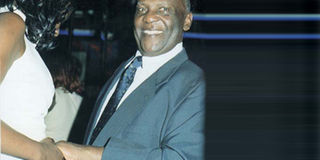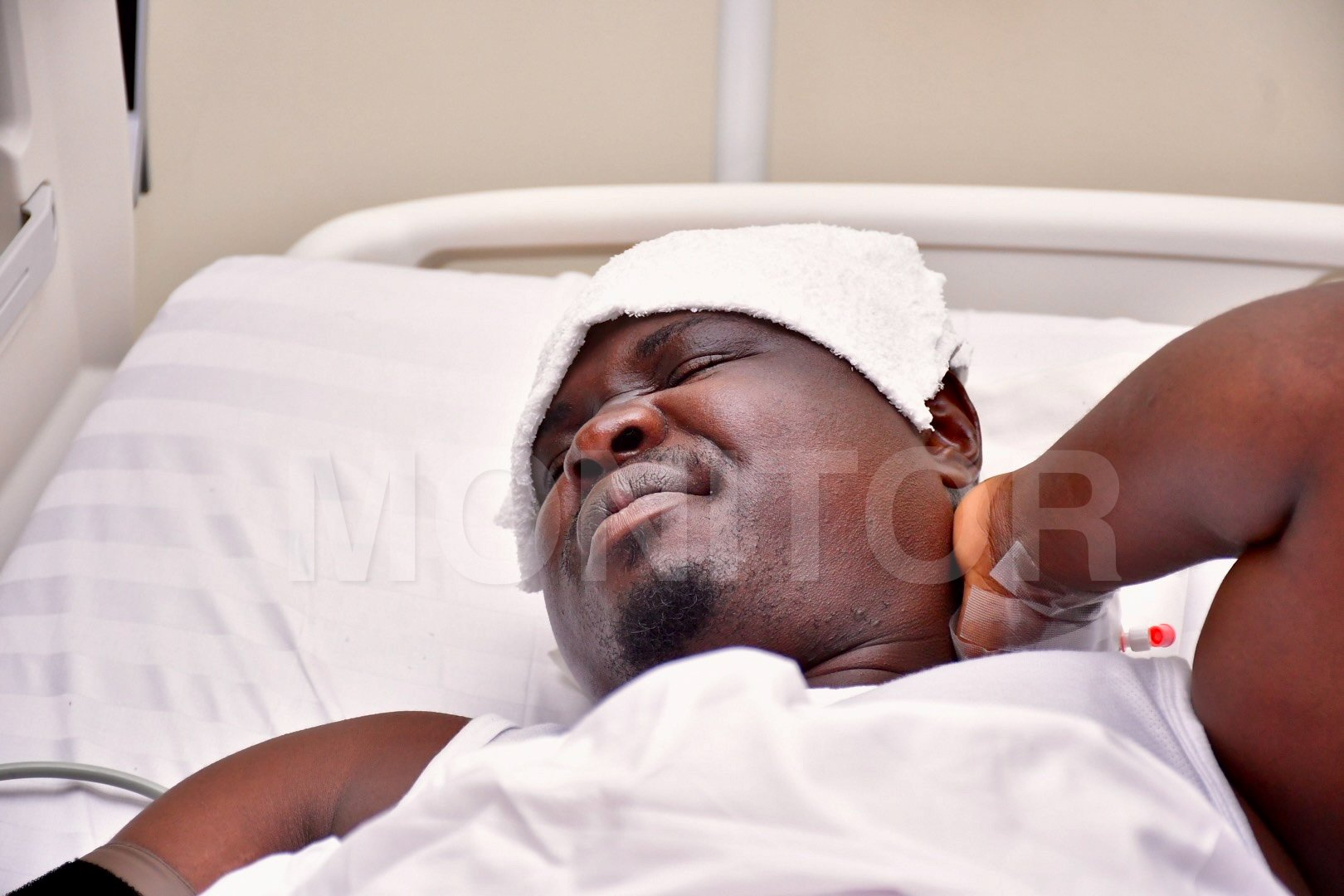Prime
Troop-less Binaisa opens war on six fronts

MAN FOR ALL SEASONS: Binaisa dances with his daughter at a function. He had to bring out the best of his wit and manipulation to retain the UPC Buganda chair in 1965. FILE PHOTO
In this series on the life of Godfrey Binaisa, Fred Guweddeko explains how as Attorney General and Buganda UPC chairman, the former President had to deal with legal landmines and an array of political foes
When in 1964, the then Leader of the Opposition in Parliament, Basil Bataringaya, crossed from the DP to the UPC, he created a new constitutional dilemma for Godfrey Binaisa, the attorney general.
The post of leader of the opposition remained vacant since there lacked a constitutional provision for appointment of a new office bearer. Binaisa, during the London Constitution Conference, had argued that including a clause on the post in the 1962 constitution was unnecessary since “everybody recognised the office”.
Therefore, the new constitution remained silent on the terms under which a new leader of the opposition would assume office. At this point, Prime Minister Apollo Obote mounted public pressure on Binaisa to exploit this lacuna to bar DP from filling Bataringaya’s post.
Binaisa dared
However, the DP and KY Members of Parliament went ahead and chose Alex Latim as their Leader in Parliament—and dared Binaisa to choke him. The debate and events surrounding the Leader of the Opposition position ensured that Binaisa was in the country until April 1965, when he finally flew to London for the conclusion of the Buganda Appeal on the Lost Counties referendum.
The appeal went Binaisa’s way—leaving Buganda defeated. There was the usual tension at Mengo created by the KY but police deployed to prevent violence. In London, the press asked Binaisa what legal steps the UPC government was taking to check violence by the KY. He told the media that the UPC would henceforth hold Buganda leaders responsible for violence meted out by KY. Binaisa added that the new Katikkiro, Mayanja Nkangi, would have to answer for the anarchy in Buganda.
Another revelation by Binaisa in London was that he had instituted measures for the UPC government to stop Buganda from filing cases in the Privy Council in the UK.
This was ironical, considering that during the 1962 London Conference, it was Binaisa who had convinced Buganda’s and other delegates that the Privy Council was the security of the new Uganda Constitution.
Fresh test
Another tough test for Binaisa came in May 1965 when Security State Minister and UPC secretary general Grace Ibingira announced his government’s decision to declare the KY Movement an illegal organisation. Ibingira announced that Attorney General Binaisa had been given the task of drafting this new legislation.
Alex Latim, the new Leader of Opposition, told Binaisa that banning the KY Movement was a violation of the constitutional right of association. Binaisa, in reply, cited the colonial laws that gave the government ample powers to ban any organisation that threatened peace, security, law and order.
It should be noted that Binaisa at this point was turning to the same tyrannical colonial laws that had been used to ban his Uganda National Movement and the Uganda Freedom Movement—that had been struggling for Uganda’s independence.
Binaisa, in fact advised that there was no need for a new law—just a resolution since there was ample evidence of violence, insecurity, threats and intimidation—orchestrated by the KY Movement.
Another matter came up at this point that needed Binaisa’s response.
There were reports that people outside Buganda but thought to have links with KY were being arrested.
Binaisa told Parliament that what was happening was not a matter of the law but a political issue. The arrests were a manifestation of KY’s “rejection” by federal and district units outside Buganda. He also passed the buck of explanation to the minister for regional administration.
Kakonge-Ibingira wars
For Binaisa’s political life, a rare boost also emerged at this time. Paulo Muwanga, a preferred choice to lead the UPC in Buganda, resigned his parliamentary seat to pave way for John Kakonge’s return to politics. Muwanga moved to Uganda’s embassy in Egypt.
This was to turn into a blessing in disguise—since the ensuing wars created by Kakonge’s return—left Binaisa clinging onto the chairmanship of the UPC in Buganda.
The return for Kakonge reignited the Communist vs. Capitalist political battles. Grace Ibingira’s Capitalist group sought to ally with KY and DP in Buganda and Parliament to oust Obote who was on the Communist side.
When the first round of this battle had taken root in 1963, Binaisa had been in Ibingira’s camp. However, this time round, the group rejected him since Binaisa was unpopular with both the KY and DP. With the Kakonge axis also unwilling to accommodate him, Binaisa remained a sole player.
But the political schemer and animal in Binaisa came to the fore in 1965 when the UPC Buganda chapter was to hold its delegates conference. As chairman, he created multiple party branches each with a minimum number of members. In August, when the elections were held, Binaisa, riding on his newly-created branches, defeated the candidates of the two major camps, retaining chairmanship of UPC’s Buganda chapter.
Common enemy
But he did not taste the victory for long. Both Ibingira and Kakonge, who never saw eye to eye, united with the sole reason of kicking out Binaisa. Without giving reasons, the UPC Central Executive Committee, rejected Binaisa’s election and ordered fresh UPC Buganda elections.
The silver lining here for Binaisa was that being the incumbent, nullification meant he retained his seat. But more perplexing for his adversaries was that as chairman, it was Binaisa’s responsibility to the next Buganda regional delegates’ conference and elections.
Defiant Binaisa
Knowing that the central executive committee was opposed to his re-election, Binaisa also hit back. He refused to announce a new date for re-elections. By October 1965, it was clear that Binaisa was fighting a one-man war against Buganda, the KY, UPC-Ibingira, UPC-Kakonge, UPC central executive committee and the DP parliamentary group. Question is; would he manage?
With a stalemate, the UPC Ibingira camp established a separate UPC Buganda region headquarters under the interim chairmanship of a former KY Minister Lumu. The UPC Kakonge camp established its own offices operated by Fenekansi Lubowa and Peter Nyago. Binaisa also maintained his UPC Buganda region headquarters office.
From October 1965 to end of January 1966, Binaisa’s intransigence ensured that three UPC Buganda region headquarters existed. Each of the three offices was guarded by both armed police and private gangs of ‘muscled youths’ (kanyama).
Calming the nation
Amid the stalemate, Binaisa made a public statement in his capacity as Attorney General and UPC Buganda chairman, on the situation in the country.
He denied claims that there was a Communist plot to capture government as alleged by the UPC Ibingira Camp in collaboration with KY. Binaisa also announced that there was no plot by the UPC Ibingira Camp to oust Obote from the prime ministership of Uganda.
He categorically made it clear that there were no attempts to bring down the government by either camp of the UPC. What no spectator could tell was that in five months time—in February 1966—Binaisa would be party to the eventual abrogation of the 1962 constitution.
Continues tomorrow




